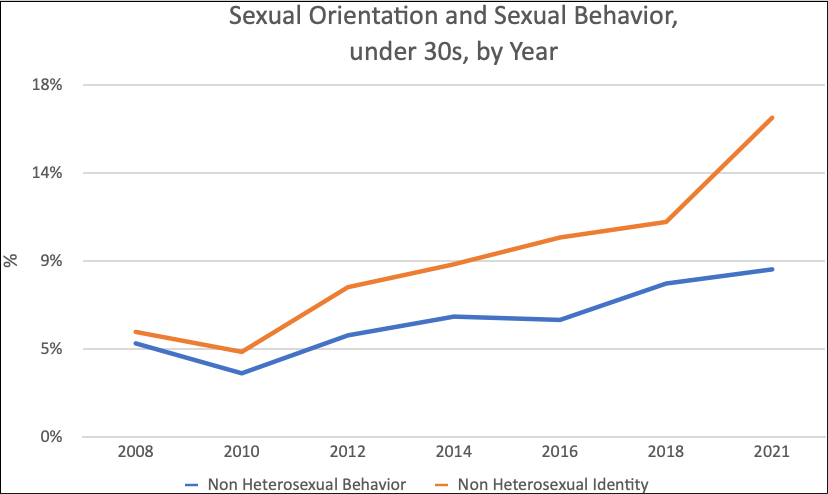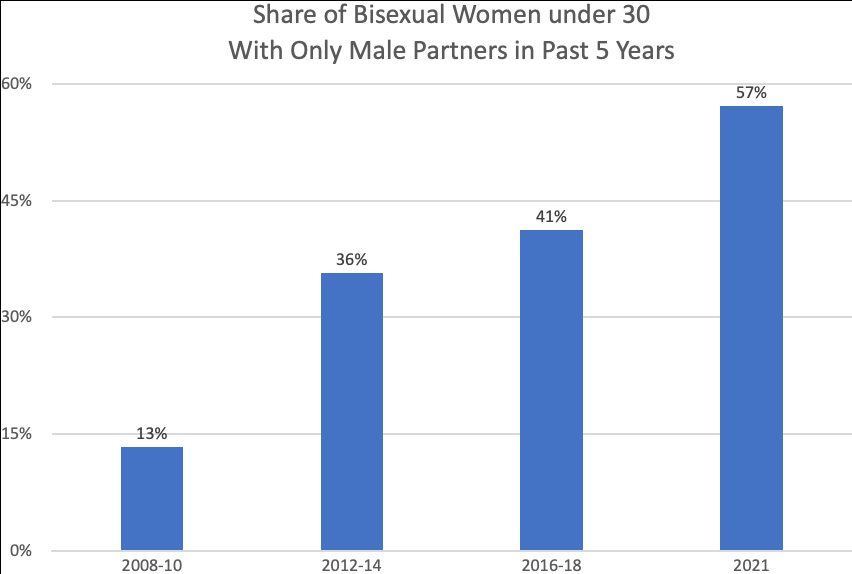In conversation on social media the other day, I speculated that in years gone by, some possibly significant proportion of self-identified lesbians would probably identify as asexuals today. Coming of age long before more relaxed modern attitudes toward non-heterosexual relationships, women who were not attracted to men would probably assume that this lack of attraction meant they must be lesbians. Similarly, Eric Kaufmann discusses a recent survey that shows some interesting divergence among GenZ adults between their declared sexual orientation and their actual behaviour:
A granular look at survey data on same-sex behaviour and LGBT identity shows that identification is increasingly diverging from behaviour. More importantly, those who adopt an LGBT identity but display conventionally heterosexual behaviour are a growing and distinct group, who lean strongly to the left politically and experience considerably greater mental health problems than the rest of the population.
By contrast, those who engage in same-sex behaviour are more politically moderate and psychologically stable. These facts sit awkwardly with the progressive view that the rise in LGBT identity, like left-handedness, is explained by people increasingly feeling that they can come out of the closet because society is more liberal. My analysis of these data raise another interesting question: Has some of the increase in anxiety and depression among young people, like the LGBT identity surge, arisen from a culture that values divergence and boundary-transgression over conformity to traditional norms and roles?
[…]
But has the LGBT share of young people really tripled in a decade? It has not. First, a growing share of LGBT identifiers engage in purely heterosexual behaviour. Figure 1, drawn from the General Social Survey (GSS), shows that, in 2008, about five percent of Americans under the age of 30 identified as LGBT and a similar number had a same-sex partnership in that year. By 2021, the proportion identifying as LGBT had increased 11 points to 16.3 percent but the share reporting same-sex relations had only risen four points, to 8.6 percent. LGBT identity had become twice as prevalent as LGBT behaviour. We must also bear in mind that 20 percent of young people now report no sex in the previous year, which means the four-point rise in same-sex partnering since 2008 is actually closer to a three-point rise: not nothing, but hardly a sexual revolution.
The trend towards greater LGBT identification has been particularly pronounced for young women, among whom there are three bisexuals for every lesbian in the 2018–21 period. Among young men, on the other hand, gays outnumber bisexuals and the LGBT total is only half as large as it is for women. Other large major surveys conducted by the Foundation for Individual Rights in Education (FIRE) and by Cooperative Congressional Election Study (CCES) find a similar pattern.
Furthermore, the GSS data show that bisexual women are the fastest-growing category, accounting for a disproportionate share of the post-2010 rise. A closer look at trends among female bisexuals in figure 2 shows that an increasing share of them display conventional sexual behaviour. In 2008–10, just 13 percent of female bisexuals said they only had male partners during the past five years. By 2018 this was up to 53 percent, rising to 57 percent in 2021. Most young female bisexuals today are arguably LGBT in name only.








